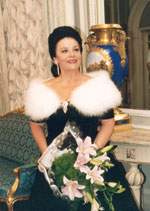 Irina Bogacheva
Irina Bogacheva
Mezzo-soprano
People’s Artist of Soviet Union, leading soloist of the Mariinsky theatre,
Professor of Saint-Petersburg Conservatory,
chief of Department of Solo Singing
Irina Bogacheva is a world-famous singer. Has graduated from the Leningrad State Conservatory where studied under prof. A.Levando. Has undergone apprenticeship under professor Barra at La Scala in Milan, Italy during 1968-1970. Having won the Glinka Competition while still a student, she has been invited to work at the Mariinsky Theatre where she has remained a soloist until today. At the Mariinsky she has performed a number of leading roles for mezzo-soprano in the operas of G.Bizet, G.Verdi, M.Mussorgski, N.Rimsky-Korsakov, P.Tchaikovsky, S.Prokofiev and others. Her most outstanding roles are the nametitle in Bizet’s “Carmen”, Amneris in Verdi’s “Aida” and Liubasha in Rimsky-Korsakov’s “The Tsar’s bride”.
A fantastic combination of the most beautiful voice, an impeccable vocal technique and high acting mastery makes all her public appearances unforgettable. Her opera repertory is immense. She has performed all major parts for mezzo-soprano on most important stages of the world, such as the Metropolitan Opera, Opera Bastille, La Scala, Teatro Colon, San-Francisco Opera and many others. The singer tours extensively with solo recitals in Norway, France, China, Spain, Japan, Korea, UK, Germany, Italy etc.
Her remarkable pedagogical output is worth mentioning; she is many years a professor of the Saint-Petersburg State Conservatory. A few talented singers exploring the world’s stages today had studied under her guidance; the now widely recognized Olga Borodina can alone prove of significant contribution of her teacher to the world’s opera culture. Today her former and actual students; Olga Savova, Elena Vitman, Natalia Evstafieva, Yuri Ivshin, Natalia Biriukova, Yulia Simonova, Maria Litke and Olesia Petrova are performing on stages of major opera theatres of Saint-Petersburg – the Mariinsky and the Mussorgsky.
Irina Bogacheva has been granted Government awards, appointed a Honorary Citizen of Saint-Petersburg, granted important insignia “In recognition of merit to Motherland” and “the Vernadsky Star”
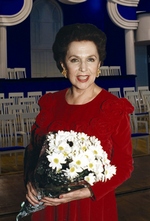 Galina Vishnevskaya
Galina Vishnevskaya
USSR Peoples’ artist
Galina Vishnevskaya, the great Russian diva, was born in Leningrad (now Saint-Petersburg). She made her debut in 1944 as a soloist in the Leningrad Operetta theatre, and in 50s Galina’s big stage career commenced. Galina Vishevskaya created more than thirty unforgettable female characters in the Russian and west-European opera chefs-d’oeuvres during her 22-year-long artistic career at the Bolshoi theatre from 1952 – to 1974.
After a brilliant debut as Tatyana in the “Eugene Onegin” opera, she performed as Aïda and Violetta (“Aïda” and “La Traviata” by Verdi), Cio-Ciosan (“Madama Butterfly” by Puccini), Natasha Rostova (“War and Peace” by Prokofiev), Katarina (“Taming of the Shrew” by Shebalin, she was the first to ever perform it in 1957), Lisa (“Queen of Spades” by Tchaikovsky), Kupava (“Snow Maiden” by Rimsky-Korsakov), Marfa (“Tsar’s Bride”) and many others. Vishnevskaya participated in the first Russian production of “The Gambler” opera by Prokofiev (part of Polina, 1974), “The Human Voice” mono-opera by Poulenc in 1965, starred in the “Katerina Izmailova” opera-film (directed by M. Shapiro in 1966). Under the Soviet regime Galina Vishnevskaya opposed the authorities. She and her husband Mstislav Rostropovitch, the great cellist and conductor, supported an eminent Russian writer and defender of human rights Alexandre Solzhenitsyn. That was one of the reasons why the couple was exposed to particular attention and pressure of the USSR intelligence service. In 1974 Galina Vishnevskaya and Mstislav Rostropovitch left the Soviet Union and in 1978 were deprived of the soviet citizenship. They settled in the USA, and then the couple lived in France and in Great Britain. Galina Vishnevskaya starred in the greatest opera theatres of the world: Covent Garden, Metropolitan-Opera, Grande Opera, La Scala, and Munich Opera, performing with the most celebrated masters of opera and theatre arts.Galina played the part of Marina in a unique opera record of “Boris Godunov” (directed by Herbert von Karajan, soloists – N. Guyarov, M. Talvella, L. Spiess, Maslennikov). And in 1989 Galina performed the same role in the film version which was directed by A. Zhulavsky, music conducted by M. Rostropovitch. While the singer was forced to live abroad, she made records of the full version of S. Prokofiev’s “War and Peace” opera, five discs of Russian romantic songs by M. Glinka, A. Dargomyzhsky, M. Mussorgsky, A. Borodin and P. Tchaikovsky. Galina Vishnevskaya’s whole life and creative work are aimed at renewing and glorifying Russian opera traditions. After perestroika began, in 1990 Galina Vishnevskaya and Mstislav Rostropovitch were granted back the Russian citizenship. At the beginning of 90-s Galina Vishnevskaya returned to Russia, became honorary professor of the Moscow Conservatoire. She described her life in the book “Galina. A Russian story”, the English version of which was published in 1984, with the Russian version following in 1991.
Galina Vishnevskaya is honorary doctor of arts with numerous universities. For many years she has been working with young people of arts, giving master-classes all over the world and heading greatest international competitions as part of the grand jury. Galina Vishnevskaya is the President of the all-Russia Fair of singers in Yekaterinburg.
On the 1st of September 2002 Galina Vishnevskaya Opera Centre was opened in Moscow that the diva had been anticipating for many years. Here she shares her accumulated experience and unique knowledge with talented young singers so that they could proudly represent the Russian School on the international opera stage. Since opening the Opera Centre made eight opera productions: “Ruslan and Ludmila” by M. Glinka, “The tsar’s bride” by N. Rimsky-Korsakov, “Faust” by Ch. Gounod, “Rigoletto” by G. Verdi, “Vampuka, the African princess” by V. Erenberg, “Iolanta” by P. Tchaikovsky, “Carmen” by G. Bizet, “Eugeny Onegin” by P. Tchaikovsky as well as numerous concerts and tour were carried out in Russia and abroad (Germany, France, Italy, the South African Republic, Azerbaijan, Macedonia, the Netherlands and others). Largest federal and regional mass media, directors of theatres and concert organizations, public opinion in general praise Galina Vishnevskaya’s missionary attitude towards culture.
Galina Vishnevskaya is awarded with most prestigious prizes for her priceless contribution to the world music art, prizes from governments of different countries: Medal for the Defense of Leningrad (1943), Order of Lenin (1971), Diamond Medal of Paris, Order for Services to Motherland of third degree (1996), Order for Services to Motherland of second degree (2006). Galina Vishnevskaya is also Grand Officer of the Order of Arts and Letters (France 1982), Chevalier of Legion of Honour (France 1983), Honorary Citizen of Kronshtadt (1996). On the 1st of September, 2004 Galina Vishnevskaya’s 60th anniversary of artistic career was celebrated, she was awarded with Saint Princess Olga Order of the Russian Orthodox Church and Peter the Great Order of the Ministry of Internal Affairs for her enormous contribution to the Russian culture.
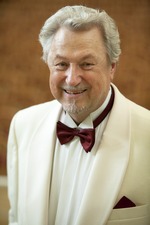 Virgilijus NOREIKA (Lithuania)
Virgilijus NOREIKA (Lithuania)
tenore
has graduated from the Lithuanian Conservatory (now the Academy of Music and Theatre in Lithuania) in Vilnius in 1958. He studied interpretation of Russian vocal music under V.V.Barsova in Moscow in 1959. He became a soloist at the National Theatre of Opera and Ballet in 1957. During 1965-1966 he has undergone training at the Teatro alla Scala in Milan, Italy and has been subsequently invited to perform in Pinkerton’s role at a staging of G.Puccini’s “Madame Butterfly”.
Virgilius Noreika has a wide artistic diapason. His repertory includes parts from 46 different operas, ranging from lyrical count Almaviva in Mozart’s “Figaro” and Lensky in Tchaikovsky’s “Evgeny Onegin” to demonic Jose in Bizet’s “Carmen” and the name title in Verdi’s “Othello”. When working at the Bolshoy Theatre in Moscow Virgilius Noreika has performed the leading parts in eight operas and has toured Paris, Milan, Prague and Brno as a member of the theatre troupe. During an extensive period of time Virgilius Noreika has sung the leading roles in G.Verdi’s “Rigoletto” and G.Puccini’s “La Boheme”, “Tosca” and “Madame Butterfly”on the stage of Berlin Staatsoper unter den Linden.
Virgilius Noreika has given over 800 recitals, during the 2005-2006 season these have taken place not only in Lithuania, but also in Saint-Petersburg, Kaliningrad, Kazan and other major Russian cities. Many programs with Virgilius Noreika, featuring over 100 musical works have been recorded on radio and television, as well as on LP. Today his voice is still in wonderful condition.
Virgilius Noreika started teaching in 1976 and is today a Professor of the Academy of Music and Theatre in Lithuania and chief of Department of solo singing. Among his graduates the following tenors stand out: Sergey Larin, Algis Janutas and Edgaras Montvidas. The students of Professor Virgilius Noreika are currently employed not only in Lithuania, but also in Latvia, Estonia, Germany, Austria and United Kingdom. During 2 years Virgilius Noreika has taught at the Latin American Academy of Singing in Venezuela, spent 5 years in Estonia as a tutor for opera soloists at the Opera and Ballet Theatre “Estonia” and had been chief of department of solo singing of the Academy of Music in Estonia. Virgilius Noreika is director of Opera Studio at the National Theatre of Opera and Ballet of Lithuania.
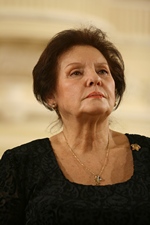 Alexandrina Mitlcheva (Bulgaria)
Alexandrina Mitlcheva (Bulgaria)
Mezzo-soprano
Alexandrina Mitlcheva made her debut as Dorabella in Mozart’s Cosi fan tutte at the Varna State Opera. After having won the First Grand Prix at the Toulouse International Singing Competition in 1966 her career transcded onto the international plane. She has been a member of the National Opera in Sofia, Bulgaria since 1968. In 1976 she was invited by former director Prof. Egon Seefehlner to join the ensemble of the Wiener Staatsoper, where she has been one of the leading mezzo-sopranos for a period of more than fifteen years. She has performed all of the major roles of the repertoire at such opera houses as La Scala,Milan, the Paris Opera, Covent Garden of London, the Vienna State Opera, the Bavarian State Opera in Munich, the Hamburg Opera, the Arena di Verona, Teatro San Carlo in Naples, the Liceo in Barcelona, the Teatro Colon in Buenos Aires, the MET, as well as in Salzburg, Edinburgh, Moscow, and San Francisco . Her concert repertoire includes works by Verdi, Mozart, Pergolesi, Rossini, Haendel, Bach, Mahler, and Franck, and as a recitalist she has explored the music of the great lieder composers and also the Russian songs of Moussorgski, Rachmaninov and Tchaikovski. Alexandrina Mitlcheva has performed under all major conductors, such as Karajan, Metha, Maazel, Ormandy, De Fabbritis, and especially Muti. She is one of the singers with the richest discography, including operas, recitals, oratoria, lieder and symphonic works.
Parallel to her career as a performing singer, Alexandrina Mitlcheva has been working as a pedagogue for over fifteen years, and in 1994 she created her own music school- The International Opera Academy Sacra. The academy is situated in Sofia, Bulgaria. Some of the students, which have participated in courses of singing and interpretation, are successful performers, making international career. She has carried out master classes at the International Bach Academy, the Paris Opera House, the Paris Conservatory, and others.
Alexandrina Mitlcheva belongs to the generation of opera singers, such as Freni, Pavarotti, Domingo, Dimitrova, Kabaivanska, Ghiaurov, which have made opera an exquisite art.
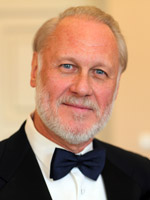 Sergey Leiferkus
Sergey Leiferkus
Sergey Leiferkus is an outstanding singer who had triumphed on all opera stages of the world. He graduated from the Leningrad State Conservatory and subsequently worked for a long period in the city’s opera theatres. The world-wide fame came in the beginning of 1980s, when he started performing at the world’s leading opera houses such as Covent Garden in London, the Viennese Staatsoper, Opera de Bastille, La Scala, the MET and Teatro Colon in Buenos Aires. Sergey Leiferkus became a permanent and warmly-welcomed guest at the major opera festivals in Edinburgh, Bregenz, Glyndebourne, Tangle wood, Ravine and Salzburg. Nowadays he focuses not only on stage productions, but also gives numerous recitals in Moscow, Saint-Petersburg, New York, London, Amsterdam, Vienna, Milan and others. He has collaborated with Boston, New York, Montreal, Berlin and London symphony orchestras and conductors Claudio Abbado, Zubin Metha, Seigi Ozawa, Yuri Temirkanov, Valeri Gergiev, Neeme Jarvi, Mstislav Rostropovich, Curt Masur and many others.
The richness of vocal timbre and an outstanding acting talent of Sergey Leiferkus have enabled him to perform in most diverse opera stagings and to build unforgettable roles. His repertory includes over 40 roles, including the name titles of Evgeny Onegin and Mazeppa by P.Tchaikovsky, Prince Igor by A.Borodin, Nabucco, Macbeth and Simon Boccanegra by G.Verdi and Don Giovanni by W.A.Mozart , Telramund ( “Lohengrin” ) and Clingsor (“Parcifal” by R.Wagner) , Amonasro (“Aida” by G.Verdi”), Don Carlos (“La forza del destino” by G.Verdi), Yago (“Othello” by G.Verdi), Rupert (“The fiery angel” by S.Prokofiev), Prince Andei (“War and peace” by S.Prokofiev) and many others. Sergey Leiferkus pays great respect to stylistic and linguistic nuances of works being performed and whereas is able to embody on stage such diverse characters as Scarpia (“Tosca” by G.Puccini), Gerard (“Andre Chenie” by U.Giordano), Escamilio (“Carmen” by G.Bizet), Zurga (“Les chercheurs des perles” by G.Bizet). The discography of Sergey Leiferkus includes well over 40 CDs and DVDs. His recordings of Russian music have attained many international prizes; some albums have been nominated to Grammy awards. In his catalogue of video recordings one can find operas staged at the Mariinsky theatre (“Evgeni Onegin” and “The fiery angel”) and at the Covent Garden (“Prince Igor” and “Othello”), three versions of “The Pique Dame” (Mariinsky theatre, Staatsoper Wien, Glyndebourne festival) and “Nabucco” (Bregenz festival). Recently Sergey Leiferkus has taken part in the television productions of operas “Carmen” and “Samson and Dalila” at the MET.
Besides such busy performing schedule Sergey Leiferkus gives master classes and teaches in Berlin, Toronto, Moscow, Boston and Oldborough.
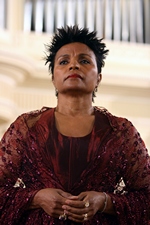 Carmen Balthrop (USA)
Carmen Balthrop (USA)
soprano
has an astonishing range of repertoire from Baroque opera to contemporary song literature. She has appeared with most of the major opera companies in North America including The Metropolitan, San Francisco and Houston, as well as European opera houses including Teatro La Fenice in Venice and Theater des Westens in Berlin. Her many orchestral appearances include oratorio and concert performances with the New York Philharmonic, National, Boston, San Francisco, Philadelphia, Pittsburgh, St. Louis, Houston and Detroit symphonies.
In great demand as a recitalist, she has performed at the White House, the Kennedy Center, Carnegie Hall, as well as in major venues in Italy, the Netherlands, Moscow and St. Petersburg, Beijing and Shanghai, Puerto Vallarta, Mexico and Nassau, Bahamas. National Public Radio chose to air, on Christmas day (2000), the live recording of her Christmas art
song recital, performed at the National Gallery of Art, Washington, D.C.
Ms.Balthrop’s discography, found on the Deutsche Grammophon, Elan, New World, Fonit Cetra, Ponto and Mondo Musica labels, includes the title roles of Scott Joplin's Treemonisha, Claudio Monteverdi's L’Incoronazione di Poppea, as well as Poppea in Handel’s Agrippina and Meermädchen in Carl Maria von Weber’s Oberon.
Ms. Balthrop’s recent world premieres of 21st century operas include: Leslie Burrs’ Vanqui, Frank Proto’s The Profanation of Hubert J. Fort and The Tuner, as well as the East Coast premiere of Jake Heggie’s At The Statue of Venus. A Professor of Voice in the School of Music at the University of Maryland, she has been inducted into the University’s Alumni Hall of Fame.
Recent engagements include: singing for the visit of President Nelson Mandela and her debut in the title role of Carlisle Floyd’s Susannah with Opera Columbus. In October 2006, she traveled to Taipei, Taiwan where she held audience with the President of Taiwan and performed in recital; February and March, 2007, respectively, found her in Philadelphia with Opera North featuring her Songs of Color recital and at the Clarice Smith Performing Arts Center in concert with Diane White, for a Women’s History Month Celebration in This is Her Story…This is Her Song. In 2007e: recitals and concerts in Moscow and St. Petersburg, together with the Brahms Trio and the Smolny choir. In February 2008 she was engaged at the world premiere of the opera Free to Sing at Strathmore Hall and her debut recital of Messiaen’s Poemes pour Mi.
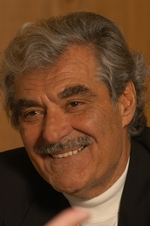 Tito Capobianco (Argentina)
Tito Capobianco (Argentina)
Tito Capobianco, Stage Director, is acclaimed for his ingenious and versatile treatment of repertory classics, from Baroque to Romantic, verismo, contemporary and his innovative updated settings of the operas starting in 1957 with a modernistic version of Puccini’s Tosca.
In addition to his unparalleled and distinctive success with his 24 opera productions at the Lincoln Center in New York City, Capobianco has staged over 250 productions in Europe, Australia, and the American continent for major opera houses, such as Paris, Berlin, Hamburg, Amsterdam, Barcelona, San Francisco, Buenos Aires, Mexico City, Sidney, Spoleto and the Las Palmas Festival, Spain.
Capobianco’s staging of American and world premieres such as Ginastera’s Don Rodrigo and Bomarzo, Menotti’s La Loca, Giannini’s Servant of two Masters, Dvorak’s Rusalka and Chabrier’s Gwendoline, plus numerous new productions, have been hailed as landmarks in opera history. These premieres have had a strong influence in the development of opera in the United States, beginning with the inauguration of the Lincoln and Kennedy Centers.
His productions of Boito’s Mephistopheles, Massanet’s Manon, Handel’s Julius Caesar and Donizetti’s Lucia di Lammermoor continue to form part of the repertoire of these centers after more than 20 years.
Much of Capobianco’s success as director is due to his first-hand experience with every phase of theatrical art; he has directed productions of opera, theater, ballet and television, and was a stage and film actor in Argentina.
In 1961, after a trail of brilliant accomplishments, that include the South American Premiers of Stravinsky’s The Rake Progress, Prokofiev’s The Love for Three Oranges, Menotti’s The Saint of Bleecker Street, Puccini’s Modern Tosca and a new production of Rossini’s La Cenerentola, he left his position as Director-Designer-Technical Director of the famous Teatro Colon of Buenos Aires, to come to the United States.
During the 1960’s, his collaboration with the soprano Beverly Sills became legendary. This led to the first televised opera production from the Lincoln Center in New York City with the production of R. Korsakov’s Le Coq D’Or as well as the west coast production of Frantz Lehar’s The Merry Widow in San Diego in 1977.
Some of the world’s most talented artists have participated in his productions, names including Claudio Abbado, Leonard Bernstein, James Levine, Loren Maazel, Luciano Pavarotti, Placido Domingo, Richard Tucker, Nicolai Gedda, Birgit Nilsson, Joan Sutherland, Beverly Sills, Monserrat Caballe, Sherrill Milnes, Tito Gobbi, Cornel McNeil, Shirley Verret, Marilyn Horne, Regina Resnik, Norman Treigle, Justino Diaz, and Jose Van Dam, to mention just a few.
Throughout his career, Capobianco has demonstrated his commitment to the educational needs of young artists. In 1968 he founded and became General Director of the Opera Center at the Juilliard School of Music in New York City. He created the Opera Department at the College of Performing Arts in Philadelphia in 1972, the San Diego Opera Center in 1977, and the Pittsburgh Opera Center in 1986.
In the late 1970s, he established the world’s first Verdi Festival in San Diego, California.
In recognition of his creative work in Italian and French opera and culture, Capobianco has been awarded by the Italian government, Cavaliere della Repubblica and Officer dans l’Ordre des Arts et Lettres by the government of France.
He has also been distinguished with numerous honorary degrees for his extensive community involvement.
Today, Capobianco concentrates exclusively on teaching young artists in the United States and Europe.
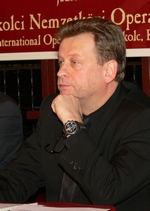 Tamás Bátor (Hungary)
Tamás Bátor (Hungary)
Basso
He was born in Budapest, and graduated from the Franz Liszt Academy of Music, in his native town. He completed his music studies in the Opera Studio of the Scala in Milan as the disciple of Giulietta Simionato and M. Luciano Silvestri.
In 1986 he made his debute as an opera singer in the Hungarian State Opera in the role of Titurel (Parsifal). This appearance was followed by guest appearances at the Scala in Milan, Piccolo - Teatro Studio in Milan (Benjamin Britten: The Ark of Noah, and Franco Mannino: Il principe Fe/ice (world premiere). He also earned reputation as concert singer. He has sung different oratories in Budapest, at the Ludwigsburg Festival, in Barcelona, Rome, Lausanne, Bern, Modena, Prague, Corsica, Rimini and in Nurnberg. In 1995 he sang Graner Messe (Franz Liszt) at the Flanders Festival in Antwerp and in Brussels under the baton of Lothar Zagrosek, Requiem (Verdi) at the Gewandhaus in Leipzig conducted by Enoch zu Guttenberg. In 1996 ha gave concerts: “Christ” an oratory by Franz Liszt at the Boden See Festival with the Südwestfunk Radio, symphonic version of “Mephistopheles” by Boito at the Gewandhaus in Leipzig, Te Deum by Anton Bruckner under the baton of Daniel Nazareth with the MDR Symphonic Orchestra.
He was the member of State Theatre in Luzern managed by Marcello Viotti between 1987-1990. he sang the following roles here: Raimondo (Lucia di Lammermoor), Basilio (Il Barbier di Siviglia), Sarastro (Die Zauberflöte), Sparafucile (Rigoletto), Rodolfo (La Sonnambula), Bartolo (Le nozze di Figaro), Seneca (L’incoronazione di Poppea), Arnold (The English Cat).
He enriched his repertoire during the time he has spent in St. Gallen (1990-1992) under the direction of John Naschling: Ferrando (Il Trovatore), Bartolo (Le nozze di Figaro), Police superintendent in Benjamin Britten’s Albert Herring, Sarastro (Die Zauberflöte).
He got in many places during his following guest performances: Madrid: Caronte (Monteverdi: Olfeo), Netherlands: Osmin (Die Entführung aus dem Serail). Copenhagen: at the Tivoli Festival Oroveso (Norma), Augsburg: Sarastro, Dublin: Duke Bluebeard (Bartók), Budapest: Guardian (Le forza del destino), Sarastro, Ferrando, so as IV. Béla (Szokolay: Margit) and Gurnemanz (Parsifal).
He debuted in the USA with the role of Ramphis (Aida) in the Portland Opera, but he also sang the role of Baldassarre (Donizetti: La Favorita) and he debuted in the Baltimore Opera as Sarastro.
He was the member of the Deutsche Nationaltheater in Weimar between 1992–2000, during this period he has sung the following roles: Rocco (Fidelio), Sarastro (Die Zauberflöte), Pimen (Boris Godunow), Osmin (Die Entführung aus dem Serail), Gurnemanz (Parsifal). King Marke (Tristan and Isolde), Eremit (Der Freischütz), Mephisto (Gounod: Faust), Landgraf (Tannhäuser), Brandel (Berlioz: Fausts Verdammnis). He also gave concerts, among others: Verdi: Requiem Dvorak: Stabat mater.
Many CD and radio recordings proof his talent: Magnificat (Caldara Sammartini and Albinoni), André Chenier and La Gioconda at the „CBS”-nél (Conducted by: G. Patane), Guntram (Richard Strauss) and Macbeth (Verdi) (Conducted by: L. Gardelli), at the Hungaroton, Two Messes (Johannes Georg Lickl) at the „International Koch”, Requiem (Mozart), Stabat Mater (Dvorak) at the Hungaroton.
His engagements in the 1999/2000 season:
In 1999, in Weimar, which was the Cultural Capital of Europe, he sang Don Giovanni, in La nozze di Figaro, Faust, Faust's Verdammnis, Zar und Zimmermann so as Die Zauberflöte. In Gera La forza del destino and Fidelio. He gave concerts all around Europe, among others at the Budapest Spring Festival in 2000, EXPO 2000 in Hannover, at the Salzburger Festspiele and at the Montpelier Festival.
Since 2000 he is the member of the Hungarian State Opera again. He sang here the followings: Il Trovatore, La forza del destino, Aida, Parsifal, Die Zauberflöte and Fidelio…
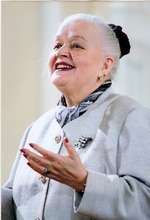 Galina Pisarenko
Galina Pisarenko
People’s Artist of Russia
Galina Pisarenko is an opera and lied- singer, professor of Moscow State Conservatory named after P.I.Tchaikovsky, laureate of international competitions, president of Mozart musical heritage lovers’ society. After graduating from Moscow State Conservatory in 1961 Galina Pisarenko has been accepted into the troupe of Moscow Musical Academic theatre named after K.Stanislavski and V.Nemirovich-Danchenko, where she has worked from 1961 to 1990. During these years she has performed over 30 opera parts by Russian and Western composers: Tatiana and Iolanta in Tchaikovsky’s “Evgeni Onegin” and “Iolanta”, Adina in Donizetti’s “L’elisir d’amore”, Fiordiliggi in Mozart’s “Cosi fan tutte”, Mimi and Musette in Puccini’s “La Boheme”, the name title in Massnet’s “Manon”, Micaela in Bizet’s “Carmen” staged by Walter Felsenshtein and others. During 1990- 1996 Galina Pisarenko worked in “Novaya Opera” theatre, where she performed the role of the name title in Prokofiev’s “Maddalena “ and in a play named “Rossini”. The years 1980-1993 have been of close and fruitful collaboration with great Russian pianist Sviatoslav Richter. Under his guidance Galina Pisarenko has compiled a number of recitals (Grieg, Schimanowsky, Medtner, Britten). For the Schimanowsky recital she has been granted a Polish prize “Orpheus” and a government award “in honor of an outstanding contribution to development of Polish Culture”. In 1985 Sviatoslav Richter had staged a Russian premiere of Britten’s “The turn of the screw”, where Galina Pisarenko performed the main role of the Governess.
Since 1975 Galina Pisarenko has been teaching at Moscow State Conservatory. Many of her former students have won prizes at the national and international singing competitions and are now performing at the world’s best stages. Galina Pisarenko gives master classes in singing in Poland, Greece, Ecuador, USA, Portugal, Austria, South Korea and Japan. She has over 30 recordings on LP and CD. The recording of Pergolesi’s “Stabat Mater” has been awarded “Grand-prix” in Paris. Galina Pisarenko’s career has been a theme subject of a number of television films.
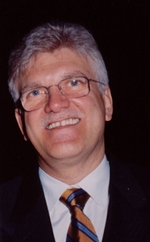 Mauro Trombetta (Italy)
Mauro Trombetta (Italy)
Artistic Director of Opera Roma
After finishing college education and in parallel with the medical institute study Mauro Trombetta graduated from Conservatorio di Torino. He studied vocal performance with Elio Battaglia, composition with Enrico Correggia, and conduting with Alberto Peyretti and Fulvio Vernizzi.
At the age of 24 he debuted as baritone and performed for 10 years in some of the best Italian and European theaters (including Hamburg, Zagreb, Lugano, Vienna, Lilla, Nizza, Bologna, Roma, Torino).
Tombetta took part in a lot of concert recordings for TV and radio in Torino and Romehe is also engaged in many operatic eventsand festivals in Italy and abroad (Novara, Savona, Susa, Bergamo, St. Etienne, Lyon and many others). Trombetta works a lot as a conductor performing concerts in Assisi, Torino, Lugano, Verona, Udine. He published a volume of rare religoius music pieces of Saverio Mercadante from the archives of Novara Cathedral.
At the age of 30 Trombetta begins his administrative career as a coordinator of theatre events occupying the position of artistic secretary of Teatro Regio di Torino. Later he worked as a head of artistic administration of all'Opera di Roma, then he became the artistic director of Arena di Verona and later served as artistic director of Teatro Bellini in Catania, then he returned to Arena di Verona and stayed with it till 2002.
Since 2003 Trombetta has been the Artistic Director of Teatro dell’Opera di Roma. For seven years he served as curator of opera and symphony events in Teatro Carlo Coccia in Novara, and then was appointed as Director of Civico Istituto Musicale Brera in Novara.
Trombetta led vocal and theatre management workshops in Italy (Portogruaro, Pescara, Foggia, Lamezia Terme), USA (Pittsburg, Palm Beach), Iceland (Reijkjavik), Turkey (Istambul, Ankara) and Germany (Bad Mergentheim). He is a president and jury member of many international music competitions (Pamplona, Madrid, New York, Roma, Spoleto, Monaco, Vienna, etc.) Trombetta published a lot of articles on music theory and vocal performance. He is a professor of singing in the A. Peri Music College in Reggio, Emilia.
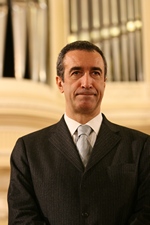 Angelo Gabrielli
Angelo Gabrielli
Angelo Gabrielli took his Saxophone diploma at the Conservatory “G. B. Martini” of Bologna in 1977. At the same time, he studied Musicology and Economics at Bologna University, where he graduated in Statistics. He also attended a Music Management Master Course at the Music School in Fiesole.
He worked as Art Direction and Production assistant at Teatro Comunale di Bologna from 1985 to 1987, under the supervision of Carlo Fontana, Gianni Tangucci and Luigi Ferrari.
In 1987, he founded Stage Door Opera Management and, later, Prima International Artists Management, two of the most important agencies in the national and international opera management business. In his career, he worked with prestigious artists such as Luciano Pavarotti, Raina Kabaivanska, Lucia Valentini Terrani, Nicolai Ghiaurov, Mirella Freni, Ferruccio Furlanetto and Renée Fleming and he followed rising talents such as Barbara Frittoli, Giuseppe Sabbatini, Anna Caterina Antonacci and Lorenzo Regazzo, who are now famous and internationally renowned artists. A great expert in musical life in the world’s stages, an authentic talent scout, he is often invited be a jury member or chairman in major singing competitions (e.g. Queen Elizabeth Competition, International Competition for Young Opera Singers Galina Vishnevskaya, International “Tchaikovsky” Competition of Moscow, All-Russian Opera Singers Competition of Saint Petersburg, International Opera Singers Competition of Sofia, CascinaLirica, Toti Dal Monte, Iris Adami Corradetti).
In June 2004, he reopened Stage Door, the Italian leading agency in opera management that represent around 150 artists (vocalists, conductors, stage directors, designers, instrumentalists).
Angelo Gabrielli teaches Saxophone and Arts Management at the Istituto di Alta Formazione “Torelli- Vecchi” in Modena, whose faculty includes such teachers as Mirella Freni and Raina Kabaivanska. He has given masterclasses on Musical Promoting at the Urbino University.
Angelo Gabrielli long maintained an active schedule of performances in Italian theatrical institutions as soloist and as a member of small ensembles like the Saxophone Italian Quartet, the first Italian ensemble playing a classical saxophone repertoire.
 Cristina Ferrari (Italy)
Cristina Ferrari (Italy)
Artistic Director of Teatro Carlo Felice
After receiving her university degree at the Department of Law of the University of Parma, Ferrari graduated from the G. Nicolini Conservatory of Piacenza, Piano Performance under guidance of Leandro Bonelli. Later she received the Diploma of Singing Instructor with professor Annamaria Lottici Favini at the A. Boito Conservatory of Parma. She started her concert career playing with chamber ensembles and then fully devoted herself to working with singers.
From 1991 to 1996 Ferrari taught piano at the School of Communal Music of Castiglione dei Pepoli (BO). From 1992 to 1993 she served as an assistant artistic director of Sabbioneta Festival that she worked with for two seasons.
From 1993 to 1997 she worked as a a musical consultant of the Accademia Opera Giovani at the young singers competition founded by Leo Nucci and also served as an artistic conoucelor at the festival Festival Sipario Castiglionese for four seasons.
In January of 1996 Cristina Ferrari worked as a musical consultant for productions of Rigoletto and Traviata staged with support of the Accademia Opera Giovani as a part of the concert season Oratorio of Caravita in Rome (broadcasted by Italian RAI TV).
In 1996 and 1997 Cristina Ferrari worked as an artistic consultant of opera productions at the Festival Internazionale di San Gimignano.
In 1997 she began her collaboration with Arturo Toscanini Foundation during the first opera production of the First Summer Po Festival .
From 1998 to 2001 she served as an artistic coordinator and the head of faculty at the advanced courses of young opera singers founded by Arturo Toscanini Foundation with financial support of Emilia Romagna Region and the European Social Fund.
From 2000 to 2004 Cristina Ferrari carried out duties of artistic secretary and an appointed producer at the Arturo Toscanini Foundation musical events planned in the Verdi Theatre in Busseto. The most important events were jubilee productions of Aida and Traviata (directed by Franco Zeffirelli) dedicated to Giuseppe Verdi in 2001 and I Vespri Siciliani in 2003 (directed by Luigi Pizzi). All shows were broadcasted by Italian Rai Uno and records of the concerts were distributed around the world.
In 2004 Ferrari was appointed as a director of operatic events at the Arturo Toscanini Foundation and producer of opera seasons in Teatro Sociale di Mantova and Teatro Municipale di Piacenza. Cristina Ferrari is also a producer of summer seasons in open theatres in Villa Pallavicino in Busseto, Vigoleno Castle in Piacenza and Piazza del Campo in Siena.
Ms. Ferrari supervises opera tours of the Arturo Toscanini Foundation in theatres of Novara, Treviso, Bari Catanzaro, Milan, Rome, Florence, Savona, Moscow, Bolzano, and Madrid (Teatro Coccia di Novara, Teatro Eden di Treviso, Teatro Piccinni di Bari, Teatro Municipale di Catanzaro, Piccolo Strehler di Milano, Teatro Argentina a Roma, Teatro La Pergola di Firenze, Teatro Chiabrera di Savona, Bolshoi di Mosca, Nuovo Teatro Comunale di Bolzano). In Summer 2006 she supervised Santander Festival Tour in Madrid.
From 2001 to 2006 she has served as a general manager and artistic director of the International Competition "Voices Verdiane" in Busseto that in different year was chaired by Virginia Zeani (2001), Leyla Gencer (2002 и 2006) and Jose Carreras (с 2003 по 2005).
Ferrari has a very specific and careful approach to young singers. She has been in the jury of a number of international competitions including the I International Opera Singers Contest of Galina Vishnevskaya in Moscow, Franco Alfano Competition in Sanremo, the "Voices Verdiane" in Busseto. Ferrari was a jury’s chair of the Mario Del Monaco Competition in Marsala.
Since February 2006 she has been a board member of the National Association of Theatre Events and Opera Productions ANTAL.
In January 2008 Ms Ferrari was appointed as Artistic director of Teatro Carlo Felice in Genoa.

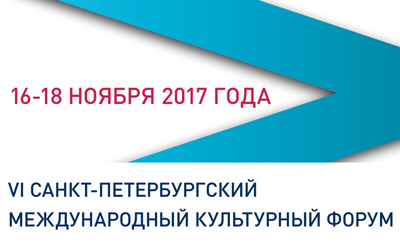


 Irina Bogacheva
Irina Bogacheva Galina Vishnevskaya
Galina Vishnevskaya Virgilijus NOREIKA (Lithuania)
Virgilijus NOREIKA (Lithuania) Sergey Leiferkus
Sergey Leiferkus Carmen Balthrop (USA)
Carmen Balthrop (USA) Tito Capobianco (Argentina)
Tito Capobianco (Argentina) Galina Pisarenko
Galina Pisarenko Mauro Trombetta (Italy)
Mauro Trombetta (Italy) Angelo Gabrielli
Angelo Gabrielli Cristina Ferrari (Italy)
Cristina Ferrari (Italy)